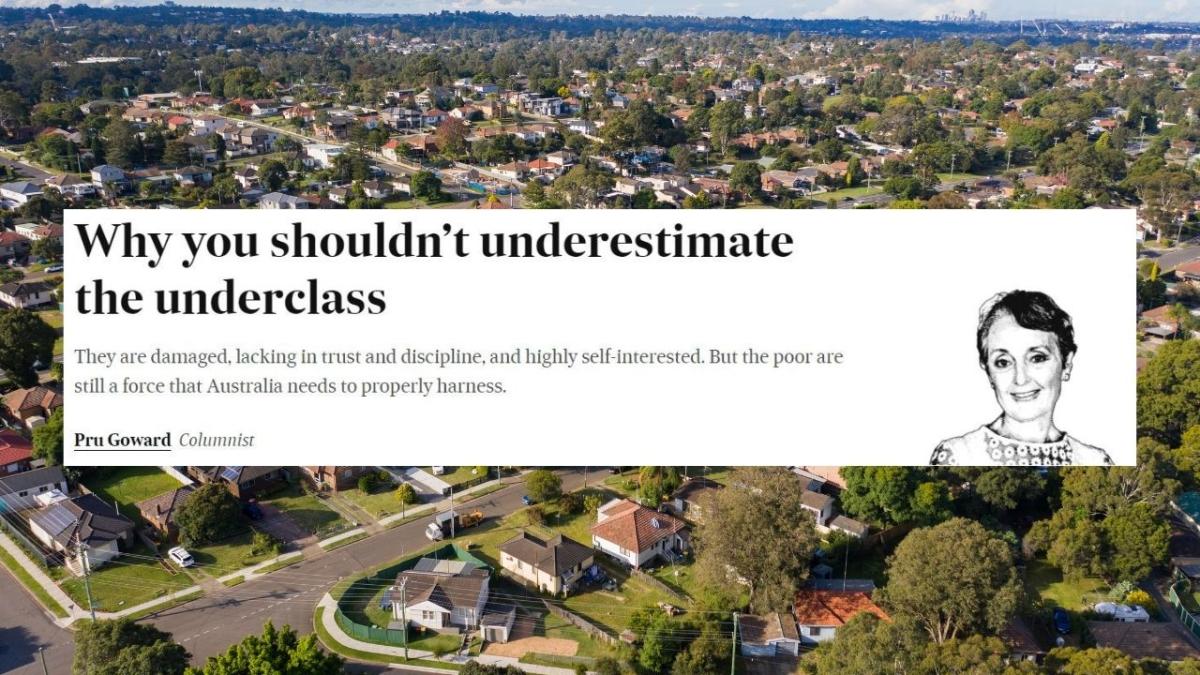
Snippets and excerpts from former NSW Minister Pru Goward‘s latest opinion piece in the Australian Financial Review have made the rounds online today, and for very good reason: it’s a snide attempt at dehumanising Australians.
In case you missed it, Pru Goward wrote a rather deranged — and unfortunately not satirical — piece on why we shouldn’t “underestimate the underclass”.
In it, Goward punches down on her own imagined version of the “poor” of Australia, and paints a ghastly vision that, apparently, she believes is very much real.
Her borderline racist version of this country’s working class bears ridiculously villainous traits such as being animalistic, “damaged”, idiotic, “not very nice” and lacking in discipline. It’s demonisation 101 from a member of this country’s rather detached elite.
Some folks online have even called the piece a display of “casual eugenics”, which honestly isn’t even that much of a stretch.
Here is the headline and subheading. Again, this is not satire.

Reading the piece, I couldn’t help but get the uncomfortable feeling that I grew up in the exact location, under some of the exact circumstances, that Goward was indirectly referring to.
One of the areas often seen as ‘poor’ (see: working class) in western Sydney, a place for so-called ‘proles’ to mindlessly work away, unaware we are the ‘pieces’ to a chess game played by the rich. At least, that’s how Goward apparently sees it.
“Despite the billions of dollars governments invest in changing the lives of proles, their number increases. Their birth rates far outstrip those of professional couples,” Goward writes.
Now, what Goward is referring to is the proletariat, or, someone whose work is their only real possession of economic significance.
(I’d like to give the benefit of the doubt here and say she isn’t referring to George Orwell‘s version of proles in 1984, who are barely literate, easy to control, mindless and “free” from all political worry.)
Either way, it’s an utterly disturbing description of this countries ‘poor’, or, really, people who aren’t university-educated, as if that’s some checkmark for automatic intelligence and worth.
I was the first university graduate in my family tree, as were most people my age were from my home suburb. A generation of kids from what Goward would deem ‘unprofessional’ couples.
To somehow equate lack of university education with lack of intelligence and lack of political drive is just wrong, and reeks of ‘I’ve never stepped foot outside my wealthy home’.
“Like the stoats and weasels of the Wild Wood in The Wind in the Willows… they rejected the rules and lived by their own. They were to be feared and were, to use my mother’s words, not very nice,” Goward writes.
“I am convinced we can do better to harness the force that the people of the underclass represent. We need to make it a focus of social policy.”
Comparing ‘poor’ people to fictional animals and pondering upon how they can be ‘harnessed’ for better use is deranged.
The poor and the homeless are not communities of people who are commodities for higher powers to use. More often than not, they are people without a community. Humans who deserve nothing but respect and care.
Goward assumes in her article that many people from western Sydney (or, what she calls, “the underclass”), made up a significant portion of the anti-vax protests because we “don’t like being told what to do”.
“The underclass is not always a happy place to be and bumping into the rest of the world mostly does not go well. People with chronic mental illness, cognitive disabilities and childhoods of trauma are mixed together in a sometimes brutal way, chaos and crisis never far from their door,” she writes.
In Goward’s mind, we come from unhappy places, speak without thought and consume incorrect vaccine information on Facebook without question — after all, thinking is for those who can afford it.
This suggestion ignores the fact that large swathes of northern NSW suburbs are filled with anti-vax conspiracy theorists. Yes, the supposedly wealthy of us are peddling nonsense too, who’d’ve thunk.
Influencers are comparing lockdown to the holocaust, faking vaccine passports and proudly attending protests. They are not exempt from being called out because they’re more privileged, and they surely aren’t smarter either.
Those in western Sydney went through some of the harshest treatment in lockdown, and actually lead the state of NSW in vaccination uptake.
Of course they did. That’s the western Sydney I grew up in, know and love. It’s absurd to suggest that anyone in this country is too mindless as a collective to do otherwise.
I hope to gay Jesus that nothing like this ever gets published again, because it’s untrue, harmful, and is a poisonous example of what the upper class must really think of everyone else.
The Australian Financial Review is owned by Nine, which also owns PEDESTRIAN.TV.



